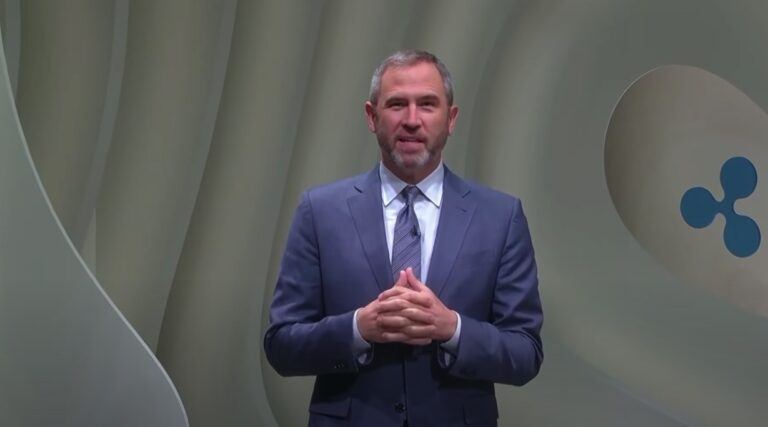Ripple CEO Explains Why He Is So Confident That XRP Is Not a Security
Last week, Ripple Labs CEO Brad Garlinghouse talked to CNBC technology reporter MacKenzie Sigalos about the U.S. SEC’s ongoing lawsuit against himself and his firm.
As you may remember, on 22 December 2020, the SEC announced that it had “filed an action against Ripple Labs Inc. and two of its executives, who are also significant security holders, alleging that they raised over $1.3 billion through an unregistered, ongoing digital asset securities offering.”
According to a report by The Daily Hodl, on September 23, during an interview on CNBC’s “Crypto World”, Garlinghouse said:
“You have to remember that 99.9% of XRP trading has nothing to do with Ripple the company. So when you talk about, okay, ‘XRP’s a security,’ I go back to something I said years ago when they started: ‘A security of what company? Who is the owner?’ I think it’s very clear there is no investment contract...
“If you get past the investment contract, which I think is hard, across the Howey Test, you have to meet all three prongs, and in the case of the XRP case, you can’t meet all three prongs for sure. And so we think that the judge will see that the law is very clear, we think the facts are very clear, we think this is just a gross overreach of the SEC trying to wrest control of that uncertainty that has existed...
“I think the ‘Ripple Test’ may be what we look at in the future. There are a lot of facts and circumstances that can be unique, but for Ripple, and what the SEC is trying to do, I do think it’s just the SEC trying to overreach the statute.”
https://youtube.com/watch?v=4TC77u9nSsk%3Ffeature%3Doembed
On Wednesday (September 21), the Ripple CEO talked to Ryan Selkis, Co-Founder and CEO at Messari, at Messari’s annual conference Mainnet (September 21-23, 2022) — in New York City.
First, Garlinghouse talked about Ripple’s mission and where it stands today:
“Today, I believe… we are effectively building enterprise blockchain base solutions. We started with cross-border payments. We sell to banks. We sell to financial institutions. We have billions of dollars of transactions going throughRippleNet, through XRP with the product we call On-Demand Liquidity.
“I think Ripple is one of the few truly scaled crypto use cases that actually is solving a problem. It’s not a science experiment. It’s not in a testing phase. If anything, we’re trying to throttle growth right now. The demand is outstripping really our ability to serve that demand right now. In Q2, which was obviously a tough quarter for crypto at large, was a record quarter for Ripple.“
Next, he addressed the misconception that Ripple runs a lot of the infrastructure that powers the XRP Ledger:
“Let’s try to start with facts. So today, of the 155 validators on the XRP Ledger, Ripple runs like six out of 155 or something… There’s been amendments passed on XRP Ledger that Ripple the company opposed. It’s traditional open source software. We can’t control it.“
As for the SEC’s lawsuit, the Ripple CEO had this to say:
- The first time that he went to meet with the SEC, he “didn’t go with any lawyers,” because he did not even imagine that XRP might be deemed a security. And there was “never even a suggestion that XRP was a securit.”
- Ripple is ready to spend even over $100 million to defend itself against the SEC, which he believes is something not just important for Ripple, but for the crypto industry as a whole.
- Back in 2017, Ripple was trying to “sign customer one” (for using XRP in production rather than in a test environment).
- Back in December 2021, when the SEC started its lawsuit against Ripple, “XRP was traded on well over 200 exchanges around the world,” and “99% of all XRP trading had nothing to with Ripple the company.”
- In recent times, the SEC has gone “cuckoo for Cocoa Puffs” (i.e. gone insane) and has been “blasting out these investigative letters.”
- In the first letter that Ripple received from the SEC, which was in 2019, they were told the SEC wanted Ripple’s “voluntary co-operation”, and in fact there was a sentence in that letter saying “we’ve made no determination about what we view XRP as.” However, the SEC claims in its lawsuit that from 2013 to 2023 Garlinghouse “should have known XRP was a security.”
- Ripple believes that there is “no investment contract” and so “you don’t even get to the Howey test.” Neither Ripple or Garlinghouse “enter into a a contract with anyone who bought XRP.”
- By mid November, Ripple should have the motion for summary judgement “fully briefed in front of the judge”, and then it could take between two and nine months for a decision to be made. It is unlikely that the judge will say a trial is needed since there is no real dispute on the facts, only on how the law should be interpreted.
https://youtube.com/watch?v=rmkF6-S5oUY%3Ffeature%3Doembed
Source: Read Full Article

